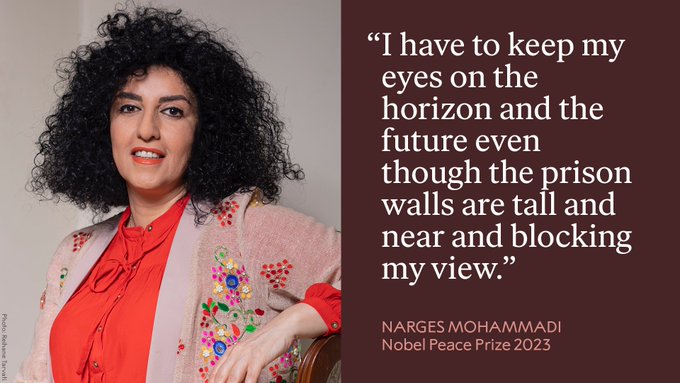GENEVA (11 October 2023) – UN experts today called for the immediate release of imprisoned women’s rights and anti-death penalty advocate, Narges Mohammadi, who was awarded the 2023 Nobel Peace Prize last week.
“We are dismayed that Iranian authorities continue to deprive Ms. Mohammadi of her liberty, despite concerns about her deteriorating health in detention, against the advice of medical professionals, in violation of their obligations under international human rights law,” said the UN Working Group on Arbitrary Detention.
On 6 October, the Nobel Committee announced that Narges Mohammadi was being awarded the Peace Prize for her fight against the oppression of women in Iran.
Mohammadi was arrested multiple times, the first arrest being in 2011 for her work advocating for incarcerated human rights activists and their families. In 2015, her activism against the death penalty led to her re-arrest, and to a sentence of additional years. She is currently serving a lengthy jail sentence in Tehran’s Evin Prison for “spreading anti-state propaganda.”
The UN Working Group previously determined Narges Mohammadi’s detention is arbitrary and called for her immediate release, compensation and reparations. The Working Group found that her detention breached the Universal Declaration of Human Rights and the International Covenant on Civil and Political Rights. The experts also concluded that the arrest and detention of Narges Mohammadi constituted a violation of international law on the grounds of discrimination on the basis of her status as a human rights defender.
The experts urged the Government of Iran to immediately release Ms. Mohammadi and ensure she receives the healthcare she needs.
“It is deeply regrettable that despite calls by the UN and the international community, Iranian authorities continue to criminalise Narges Mohammadi for her work in defence of human rights,” they said.
*Working Group on arbitrary detention: Priya Gopalan (Chair-Rapporteur), Matthew Gillett (Vice-Chair on Communications), Ganna Yudkivska (Vice-Chair on Follow-Up), Miriam Estrada-Castillo, and Mumba Malila.
The Special Rapporteurs and Working Groups are part of what is known as the Special Procedures of the Human Rights Council. Special Procedures, the largest body of independent experts in the UN Human Rights system, is the general name of the Council’s independent fact-finding and monitoring mechanisms that address either specific country situations or thematic issues in all parts of the world. Special Procedures’ experts work on a voluntary basis; they are not UN staff and do not receive a salary for their work. They are independent from any government or organization and serve in their individual capacity.
UN Human Rights, Country Page — Iran


